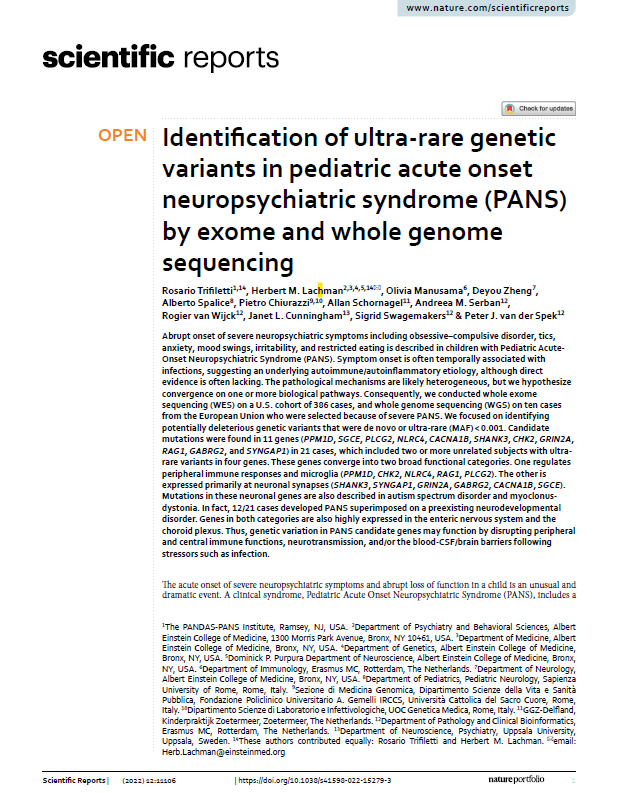EXPAND INITIATED GENETIC RESEARCH PUBLISHED

https://www.nature.com/articles/s41598-022-15279-3
Discovery Could Lead to Improved Diagnosis and Treatment of Children Suffering from PANS and PANDAS
Newly published research into the genetics of patients suffering from pediatric acute-onset neuropsychiatric syndrome (PANS) has identified several rare gene mutations that appear related to the disabling neuroinflammatory disorder, which affects thousands of children and young adults worldwide.
The research paper is the first published comprehensive assessment of genetic factors involved in PANS. It was conducted by Professor Peter van der Spek of Erasmus MC in Rotterdam in collaboration with Professor Herbert Lachman at the Albert Einstein College of Medicine in New York, and a PANS clinician Dr. Rosario Trifiletti from Ramsey, New Jersey. This could usher in a new era of diagnosis and treatment for those suffering from this disorder, which is often misdiagnosed. According to Professor van der Spek, “Misdiagnosis results in inadequate and ineffective treatment, causing unnecessary additional pain for patients and their families dealing with this debilitating disorder.”
PANS is viewed as a neuroinflammatory disorder triggered by streptococcus and other infections, which leads to the sudden onset of an array of severe psychiatric symptoms, including OCD, restricted eating, and anxiety. PANS most commonly occurs in children with immune disorders and a history of frequent infections, and family histories of immune or autoimmune problems. Some children with PANS have an underlying neurodevelopment condition, such as autism spectrum disorder. In some cases, PANS patients become suicidal and need to be institutionalized.
PANS is often associated with indications of inflammation and the development of autoantibodies that can attack the brain. The diagnosis is controversial because signs of inflammation and autoantibodies are often absent in many children showing PANS symptoms. As a result, many clinicians are unwilling to make the diagnosis, which prevents affected children from receiving effective treatments with antibiotics and immunomodulators, such as non-steroidal anti-inflammatory drugs (NSAIDs), intravenous immunoglobulin (IVIG), corticosteroids, and the B-cell inhibitor Rituximab.
To make matters worse, parents are sometimes seen as being overly intrusive or are even accused of seeking attention by exaggerating or making up symptoms of their child (a psychiatric condition known as Munchausen syndrome by proxy).
Hypothesis Collaborated
One hypothesis that could explain why some PANS children display markers of inflammation and others do not is that different genetic pathways are involved. The new research collaborates this hypothesis.
The research team identified the rare mutations in 11 genes in 21 patients. Some of the gene mutations affect immune function, including the function of microglia, the brain’s immune cells, while others affect neurons. Several novel concepts are described in the paper, including the possibility that some of the genes could also affect the integrity of the brain blood barrier and the gut-brain axis. Much more research needs to be carried out, but a big step has been taken towards defining the biological mechanisms underlying PANS.